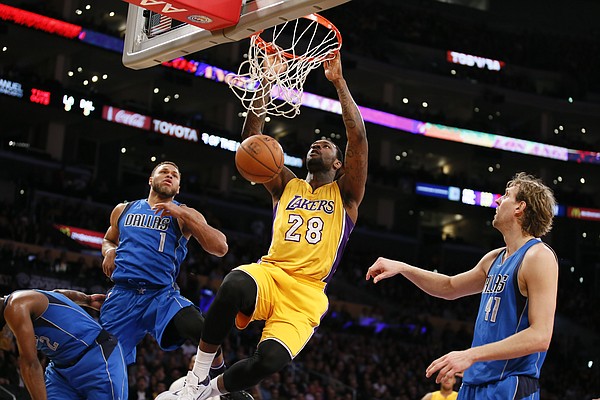by Smart City Memphis (RSS) | July 3rd, 2017 12:51am CDT
When you are 6 feet 9 inches tall and earn $6 million a year as an NBA player, people listen to you when you speak.
That was clear from the interest in Tarik Black’s recent news conference announcing his new foundation, which will sponsor a four-day summer basketball camp at Ridgeway High School for 50 boys 11 to 15 years old. It is just the opening salvo in a broader campaign aimed at reducing poverty and “inspiring underserved youth to become visionaries.” Ultimately, the lifelong Memphian’s plan is to expand the program for boys, add a camp for girls, and arrange for young people to travel outside of Memphis to broaden their experiences.
The Los Angeles Lakers center pointed out that Memphis is lucky to have so many local basketball stars return to help the city, including Andre Turner, Elliott Perry, Ken Moody, Penny Hardaway, and John Wilfong. As if to emphasize that point, days after his announcement, another NBA player, Thaddeus Young, proposed to spend $500,000 for a new youth program in South Memphis that would take over the former Head Start and Health Loop buildings next door to his alma mater, Mitchell High School.
While basketball players in a basketball city center most of their programs on the court, Black made the point that he was “in the band first before basketball” and lamented cuts in arts and band programs.
“We need to implement life skills and we can teach basketball or band and at the same time, through mentorships and positive experiences, we can give more young people a fighting chance at a successful life,” he said.
“I am blessed by God that I can come back and be an advocate for change. I had a dream of helping the city I grew up in. Crime is running rampant because there are not as many opportunities for young people. We want to open doors and help those needing help to rise above their circumstances.”
Paying It Forward
At his announcement, in stressing the importance of mentors and role models, Black spotlighted people who kept him grounded, shaped his character, and made sure he didn’t lose confidence in himself or quit pushing toward his goals.
“I was one of the fortunate ones,” he said. “Too many young people in Memphis don’t have that kind of support and parents to guide their paths. That’s where community organizations have to pick up the slack to give every young person a fighting chance.”
His announcement raised this question: How many children in Memphis are in need of such interventions and how many are being touched by them? The answer, sadly, is that no one knows for sure.
There are about 65,000 children in Memphis living in poverty, based on the city’s child poverty rate of almost 43 percent, second highest for an American city with more than 500,000 people; however, the number of children in need of interventions include more than just children in poverty.
Everyone Deserves A Chance
The scope of the problem was indicated when the Adverse Childhood Experiences (ACE) Center Task Force of Shelby County reported that 52 percent of adults in Shelby County claim that they had at least one negative childhood experience, like abuse, neglect, household dysfunction, and violence in the home. Twenty percent reported two to three adverse childhood experiences and 12 percent experienced four or more, and with each experience, the toxic stress in youth’s lives is increased, dramatically stacking up the odds against them as they enter adulthood.
Shelby County Chief Public Defender Stephen Bush, chairman of the ACE Task Force, said, “I see daily the consequences of adverse childhood experiences in the lives of the thousands of children as they enter Juvenile Court. In fact, the vast majority of children involved in the juvenile justice system are living with the trauma of adverse experiences that include actual exposure to violence. This is no surprise. For years we’ve known about the link between early childhood traumas and future justice system involvement.”
Meanwhile, no one is tracking interventions like after-school activities and summer programs, and how often individuals use them. Local data does indicate that youths begin to show measurable improvement when they are enrolled in three or more programs.
This remains one of Memphis’ most perplexing challenges. While we are grateful for every program for youths, the ultimate question is how we can expand them to reach the tens of thousands of children who deserve a fair chance in life. To quote Tarik Black, we can do it because we have to, because everybody deserves to believe in themselves.




